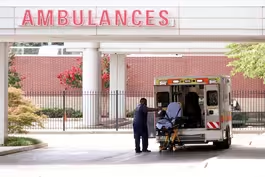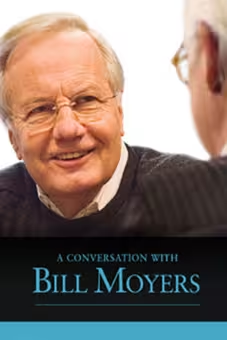
How lack of regulation for tattoo ink puts Americans at risk
Clip: 9/24/2023 | 5m 17sVideo has Closed Captions
How a lack of regulation for tattoo ink puts Americans’ health at risk
Nearly one in three Americans surveyed this summer said they have at least one tattoo, according to the Pew Research Center. But while tattoo artists are required to have a license in all 50 states and the District of Columbia, tattoo ink is totally unregulated in the United States. Dr. Thomas Rohrer, a dermatologic surgeon, joins John Yang to discuss the associated health risks.
Problems playing video? | Closed Captioning Feedback
Problems playing video? | Closed Captioning Feedback
Major corporate funding for the PBS News Hour is provided by BDO, BNSF, Consumer Cellular, American Cruise Lines, and Raymond James. Funding for the PBS NewsHour Weekend is provided by...

How lack of regulation for tattoo ink puts Americans at risk
Clip: 9/24/2023 | 5m 17sVideo has Closed Captions
Nearly one in three Americans surveyed this summer said they have at least one tattoo, according to the Pew Research Center. But while tattoo artists are required to have a license in all 50 states and the District of Columbia, tattoo ink is totally unregulated in the United States. Dr. Thomas Rohrer, a dermatologic surgeon, joins John Yang to discuss the associated health risks.
Problems playing video? | Closed Captioning Feedback
How to Watch PBS News Hour
PBS News Hour is available to stream on pbs.org and the free PBS App, available on iPhone, Apple TV, Android TV, Android smartphones, Amazon Fire TV, Amazon Fire Tablet, Roku, Samsung Smart TV, and Vizio.
Providing Support for PBS.org
Learn Moreabout PBS online sponsorshipJOHN YANG: Tattoos in early 20th century America were largely limited to sailors and circus performers.
But today, there's hardly a major celebrity who isn't inked.
And it's not just the famous.
When the Pew Research Center surveyed nearly 8,500 Americans this summer, 32 percent said they had at least one tattoo and 22 percent said they had more than one.
By one estimate, tattooing in America is a one and a half billion dollar industry.
But while all 50 states and the District of Columbia required tattoo artists to have a license, tattoo ink is totally unregulated in the United States, although the Food and Drug Administration has recently proposed guidelines.
Dr. Thomas Rohrer is a dermatologic surgeon and a private practice in the Boston suburbs and he's the former president of the American Society for Dermatologic Surgery.
Dr. Rohrer, how is tattooing done?
And what are the risks from that process?
DR. THOMAS ROHRER, Dermatologic Surgeon: Sure, well, tattooing can be done in a couple of different ways.
One very crudely, you can put anything into the skin with ink on it and create a little deposit and create some color there.
So an amateur tattoo.
But the professionals use a machine that has a whole bunch of needles in it kind of like a sewing machine that goes in and out of the skin and deposits ink of different colors at different depths to give you a more colorful picture.
So the risks for tattoos, I guess, start initially with infection.
All right, so since that tattoo needle or whatever device they're using to get into the skin has to penetrate the skin, you can potentially inject some bacteria or virus into the skin and then cause a problem.
So there have been certainly a number of cases of bacterial infections, or viral infections, including hepatitis.
And then down the road, what happens with the ink, there can also be problems, some of those inks, some people are allergic to in this country and around the world.
And they have these anything from a mild to a really massive allergic reaction to the ink that's gone into their skin, which causes burning, itching, sometimes ulceration and scarring with that.
One of the other issues we've been seeing with the tattoo, particularly when people get a big tattoo, like a sleeve covering a large area is they cover a good portion of their skin.
So if that patient were to develop melanoma in that area, it's very difficult for the patient to see that and for the physician to see it.
There also been cases of tattoos reacting when someone goes for an MRI, which can be an issue.
And lastly, there's some question about some of these tattoos potentially leading to cancer down the road.
JOHN YANG: In your practice, have you seen with the increase of the number of people who have tattoos?
Have you seen an increase in the number of people coming in with complications?
THOMAS ROHRER: Yeah, we have seen an increase in the complications, but is probably, you know, reflective of just the increase in the number of patients getting tattoos.
So overall, I don't know if the percentage of people getting complications has changed.
We've definitely seen an uptick over the last few years.
JOHN YANG: Then talk about the ink because as I say that it's not regulated in the United States, the EU, the European Union has banned some ingredients.
What do we know about what's in the ink in the United States?
THOMAS ROHRER: Well, unfortunately, you know very little about what's in the ink in the United States, because it isn't regulated.
Now they can use absolutely anything.
There's actually no ink that is FDA approved for injection into the skin.
And I think that's the main problem.
I think it'd be a lot better if they were able to standardize it and get rid of like the EU did some of the steps could potentially be harmful, and limited to a handful of them.
JOHN YANG: And the FDA is put out proposed guidelines.
Is that enough?
THOMAS ROHRER: Yeah.
I mean, I think some set of guidelines would be fine.
That should be a working base to start with, and then we can go down the road, but I do think that's would be very helpful to help regulate the tattoo industry.
JOHN YANG: And that Pew survey that we talked about at the in the introduction, about a quarter of the people who do have at least one tattoo said they regret it.
How is tattoo removal, but how does that work?
And have you seen a lot of people coming in asking for that?
THOMAS ROHRER: Well, sure, and that's where we see mostly, you know, patients coming in who do regret it and in the numbers vary from, you know, there's one study that showed 78 percent that people regretted it, some say 40, you know, and at NIH one (ph) and one by tattoo artists only showed 2 percent regretting.
So the numbers vary.
How we remove them is with lasers.
These days, we've got a lot of different lasers, the new picosecond lasers work much better than our older lasers.
And I think if someone's getting a tattoo removed, make sure they go to a board certified dermatologist who's got some of these high tech lasers, and not just some mom and pop shop that may have the millisecond lasers, which could actually cause some harm.
JOHN YANG: You said earlier that you tend to see the patients who have problems come in.
But if a patient were to come in and say and say to you, I'm thinking about getting a tattoo, what would be your advice?
THOMAS ROHRER: Yeah, I mean, I guess the same thing is like tell the my family members, be sure he wants a tattoo and know that there are some complications that can happen with it and also know that it's going to hurt a lot more and cost a lot more to remove that tattoo than it is to get the tattoo placed in first time.
JOHN YANG: Dermatologic surgeon Thomas Rohrer.
Thank you very much.
THOMAS ROHRER: My pleasure.
Thank you.
The life of Lydia Mendoza, the 1st queen of Tejano music
Video has Closed Captions
Clip: 9/24/2023 | 4m 16s | The life of Lydia Mendoza, the 1st queen of Tejano music (4m 16s)
Why high ambulance costs are still a problem in the U.S.
Video has Closed Captions
Clip: 9/24/2023 | 5m 18s | Why unexpectedly high ambulance bills are still a problem in the U.S. (5m 18s)
WTA resumes China Open despite questions about Peng Shuai
Video has Closed Captions
Clip: 9/24/2023 | 5m 25s | WTA returns to China despite unresolved questions about tennis star Peng Shuai (5m 25s)
Providing Support for PBS.org
Learn Moreabout PBS online sponsorshipSupport for PBS provided by:
Major corporate funding for the PBS News Hour is provided by BDO, BNSF, Consumer Cellular, American Cruise Lines, and Raymond James. Funding for the PBS NewsHour Weekend is provided by...














